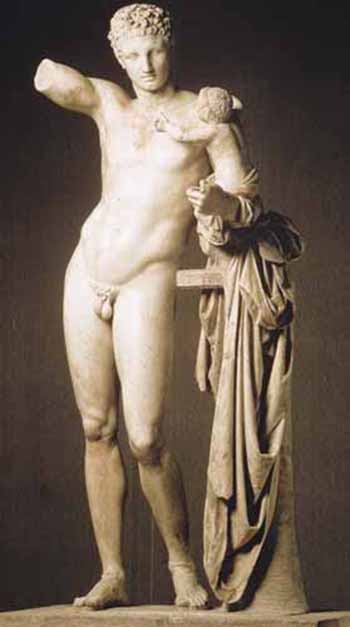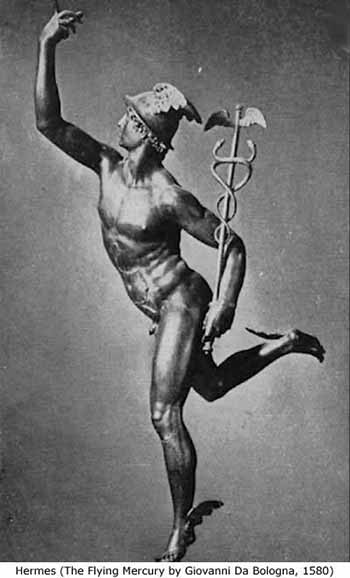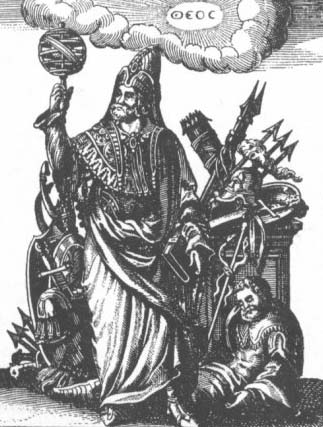



�Hermes in Greek mythology, is the Olympian god of boundaries and of the travelers who cross them, of shepherds and cowherds, of orators and wit, of literature and poets, of athletics, of weights and measures, of invention, of commerce in general, and of the cunning of thieves and liars.
In Roman mythology he was Mercury or the trickster who outwits other gods for his own satisfaction or the sake of humankind. His attributes and symbols include the herma, the rooster and the tortoise, purse or pouch, winged sandals, winged cap, and the herald's staff, the Greek kerykeion or Latin caduceus in his left hand.
As a translator, Hermes is a Messenger from the Gods to humans, sharing this with Iris. An interpreter who bridges the boundaries with strangers is a hermeneus. Hermes gives us our word "hermeneutics" for the art of interpreting hidden meaning. In Greek a lucky find was a hermaion.
Hermes, as an inventor of fire, is a parallel of the Titan, Prometheus. In addition to the syrinx and the lyre, Hermes was believed to have invented many types of racing and the sport of boxing, and therefore was a patron of athletes. Modern mythographers have connected Hermes with the trickster gods of other cultures.
Hermes also served as a psychopomp, or an escort for the dead to help them find their way to the afterlife (the Underworld in the Greek myths). There he is depicted as the only god besides Hades and Persephone who could enter and leave the Underworld without hindrance. Among the Hellenes, as the related word Herma ‘a boundary stone, crossing point’ would suggest, Hermes is the Spirit of Crossing-Over. As such he was seen to be manifest in any kind of interchange, transfer, transgressions, transcendence, transition, transit or traversal, all of which activities involve some form of crossing in some sense. This explains his connection with transitions in one’s fortunes, with the interchanges of goods, words and information involved in trade, interpreting, oratory, writing, with the way in which the wind may transfer objects from one place to another, and with the transition to the afterlife.
In the Olympian pantheon, Hermes was the son of Zeus and the Pleiade Maia, a daughter of the Titan Atlas. Hermes was born on Mount Cyllene in Arcadia to Maia. As the story is told in the Homeric Hymn, the Hymn to Hermes, Maia was a nymph, but Greeks generally applied the name to a midwife or a wise and gentle old woman; so the nymph appears to have been an ancient one, or more probably a goddess. At any rate, she was one of the Pleiades, daughters of Atlas, taking refuge in a cave of Mount Cyllene in Arcadia.
The infant Hermes was precocious. His first day he invented the lyre. By nightfall, he had rustled the immortal cattle of Apollo. For the first sacrifice, the taboos surrounding the sacred kine of Apollo had to be transgressed, and the trickster god of boundaries was the one to do it.
Hermes drove the cattle back to Greece and hid them, and covered their tracks. When Apollo accused Hermes, Maia said that it could not be him because he was with her the whole night. However, Zeus entered the argument and said that Hermes did steal the cattle and they should be returned. While arguing with Apollo, Hermes began to play his lyre. The instrument enchanted Apollo and he agreed to let Hermes keep the cattle in exchange for the lyre.
Hermes' symbols were the rooster and the tortoise. He can be recognized by his purse or pouch, winged sandals, winged cap, and the herald's staff, the kerykeion.
Hermes was the god of thieves because he was very cunning and shrewd and was a thief himself from the night he was born, when he slipped away from Maia and ran away to steal his elder brother Apollo's cattle.
Hermes was loyal to his father Zeus. When the nymph Io, one of Zeus' consorts, was trapped by Hera and guarded over by the many-eyed giant Argus Panoptes, Hermes saved her by lulling the giant to sleep with stories and then decapitating him with a crescent-shaped sword.
In the Roman adaptation of the Greek religion, Hermes was identified with the Roman god Mercury, who, though inherited from the Etruscans, developed many similar characteristics, such as being the patron of commerce.
A syncretic conflation of Hermes with the Egyptian god of wisdom Thoth produced the figure of Hermes Trismegistus, to whom a body of arcane lore was attributed in the Greco-Roman culture of Alexandria. The writings attributed to Hermes Trismegistus were edited and published in the Italian Renaissance.
Hermes is a Greek mythological figure who is a son of Zeus and Maia. The name Hermes was derived from the Greek word herma which is a square or rectangular pillar in either stone or bronze, with the head of Hermes (usually with a beard), which adorned the top of the pillar, and male genitals near to the base of the pillar. These were used in Athens to ward off evil and also as road and boundary markers all over Greece markers.
Due to the fact that these statues were used as road markers Hermes was the god of land travel. He was also the god of shepherds, merchants, weights and measurements, oratory, literature, athletics, and thieves. His symbols were the cock, tortoise, purse or pouch, winged sandals, winged cap, and the heralds staff. Hermes was the god of thieves because he was very cunning and shrewd and was a thief himself from the night he was born. The night Hermes was born he snuck away from his mother and ran away to steal his Brother Apollo's cattle.
He drove the cattle back to Greece and hid them and covered their tracks. When Apollo accused Hermes, Maia said that it could not be him because he was with her the whole night, however Zeus entered into the argument and said that Hermes did steal the cattle and they should be returned. While arguing with Apollo, Hermes began to play his lyre. The instrument enchanted Apollo and he agreed to let Hermes keep the cattle in exchange for the lyre.
Hermes was the herald to the gods (messenger of the gods) so he had to guide the souls of the dead to the underworld, the person who does this is called a psychopomp. Hermes was very loyal to his father Zeus, when Zeus fell in love with the nymph Io, Hermes saved her from the many-eyed Argus by lulling him to sleep with stories and songs, decapitating him with a crescent-shaped sword. Some say that is representative of killing the disapproving eyes of the community, always policing good conduct in a shame-based society through their disapproving gaze.
�Though temples to Hermes existed throughout Greece, a major center of his cult was at Pheneos in Arcadia, where festivals in his honor were called Hermoea.
As a crosser of boundaries, Hermes Psychopompos' ("conductor of the soul") was a psychopomp, meaning he brought newly-dead souls to the Underworld and Hades. In the Homeric Hymn to Demeter, Hermes conducted Persephone the Kore (young girl or virgin), safely back to Demeter. He also brought dreams to living mortals.
Among the Hellenes, as the related word herma ("a boundary stone, crossing point") would suggest, Hermes embodied the spirit of crossing-over: He was seen to be manifest in any kind of interchange, transfer, transgressions, transcendence, transition, transit or traversal, all of which involve some form of crossing in some sense. This explains his connection with transitions in one's fortune - with the interchanges of goods, words and information involved in trade, interpretion, oration, writing - with the way in which the wind may transfer objects from one place to another, and with the transition to the afterlife.
Many graffito dedications to Hermes have been found in the Athenian Agora, in keeping with his epithet of Agoraios and his role as patron of commerce.
Originally, Hermes was depicted as an older, bearded, phallic god, but in the 6th century BCE, the traditional Hermes was reimagined as an athletic youth. Statues of the new type of Hermes stood at stadiums and gymnasiums throughout Greece.
In very ancient Greece, Hermes was a phallic god of boundaries. His name, in the form herma, was applied to a wayside marker pile of stones; each traveller added a stone to the pile. In the 6th century BCE, Hipparchos, the son of Pisistratus, replaced the cairns that marked the midway point between each village deme at the central agora of Athens with a square or rectangular pillar of stone or bronze topped by a bust of Hermes with a beard. An erect phallus rose from the base. In the more primitive Mount Kyllini or Cyllenian herms, the standing stone or wooden pillar was simply a carved phallus. In Athens, herms were placed outside houses for good luck. "That a monument of this kind could be transformed into an Olympian god is astounding," Walter Burkert remarked (Burkert 1985).
In 415 BCE, when the Athenian fleet was about to set sail for Syracuse during the Peloponnesian War, all of the Athenian hermai were vandalized. The Athenians at the time believed it was the work of saboteurs, either from Syracuse or from the anti-war faction within Athens itself. Socrates' pupil Alcibiades was suspected to have been involved, and Socrates indirectly paid for the impiety with his life. From these origins, hermai moved into the repertory of Classical architecture.

�Hermes was usually portrayed wearing a broad-brimmed traveler's hat or a winged cap (petasus), wearing winged sandals (talaria), and carrying his Near Eastern herald's staff -- either a caduceus entwined by copulating serpents, or a kerykeion topped with a symbol similar to the astrological symbol of Taurus the bull. Hermes wore the garments of a traveler, worker, or shepherd. He was represented by purses or bags, roosters, and tortoises. When depicted as Hermes Logios, he was the divine symbol of eloquence, generally shown speaking with one arm raised for emphasis.
Hermes was born on Mount Cyllene in Arcadia to Maia. As the story is told in the Homeric Hymn, the Hymn to Hermes, Maia was a nymph, but Greeks generally applied the name to a midwife or a wise and gentle old woman, so the nymph appears to have been an ancient one, one of the Pleiades taking refuge in a cave of Arcadia.
The god was precocious: on the day of his birth, by midday he had invented the lyre, using the shell of a tortoise, and by nightfall he had rustled the immortal cattle of Apollo. For the first Olympian sacrifice, the taboos surrounding the sacred kine of Apollo had to be transgressed, and the trickster god of boundaries was the one to do it.
His epithet Argeiphontes, or Argus-slayer, recalls his slaying of the many-eyed giant Argos who was watching over the heifer-nymph Io in the sanctuary of Lady Hera herself in Argos. Putting Argos to sleep, Hermes dispatched him with a cast stone, like a hero faced by a giant in the land of Canaan.
Pan - The satyr-like Greek god of nature, shepherds and flocks, Pan was often said to be the son of Hermes through the nymph Dryope. In the Homeric Hymn to Pan, Pan's mother ran away from the newborn god in fright over his goat-like appearance.
Hermaphroditus was an immortal son of Hermes through Aphrodite. He was changed into an intersex person when the gods literally granted the nymph Salmacis's wish that they never separate.
The god Priapus was a son of Hermes and Aphrodite. In Priapus, Hermes' phallic origins survived. According to other sources, Priapus was a son of Dionysus and Aphrodite
Eros - According to some sources, the mischievous winged god of love Eros, son of Aphrodite, was sired by Hermes, though the gods Ares and Hephaestus were also among those said to be the sire, whereas in the Theogeny, Hesiod claims that Eros was born of nothing before the Gods. Eros' Roman name was Cupid.
Tyche - The goddess of luck, Tyche, or Fortuna, was sometimes said to be the daughter of Hermes and Aphrodite.
Abderus was a son of Hermes who was devoured by the Mares of Diomedes. He had gone to the Mares with his friend Heracles.
Autolycus, the Prince of Thieves, was a son of Hermes and grandfather of Odysseus.
Extended List of Hermes' Consorts and Children

Hermes: Prophecy, Alchemy, Identities

Hermeticism